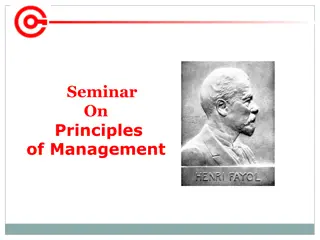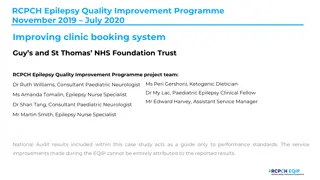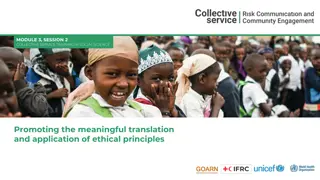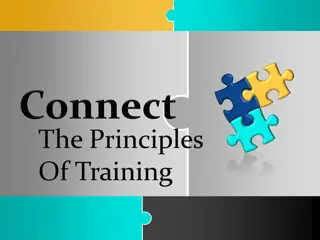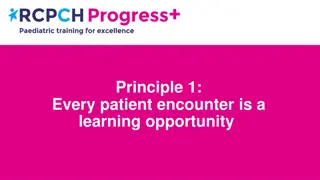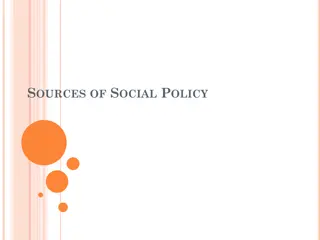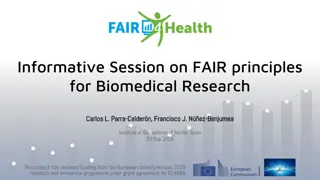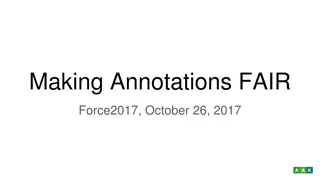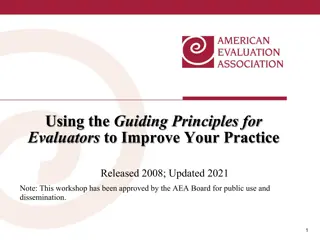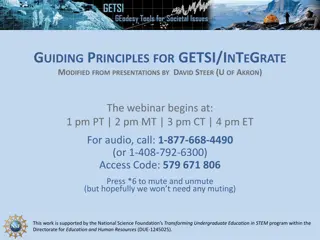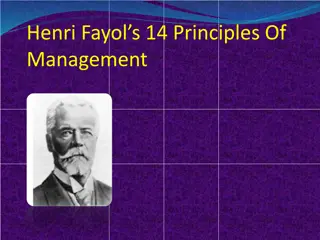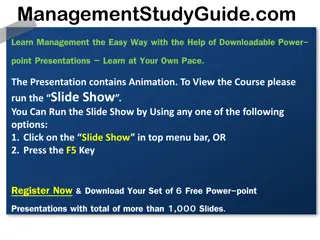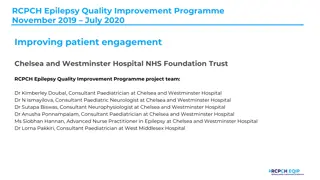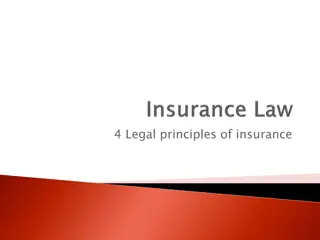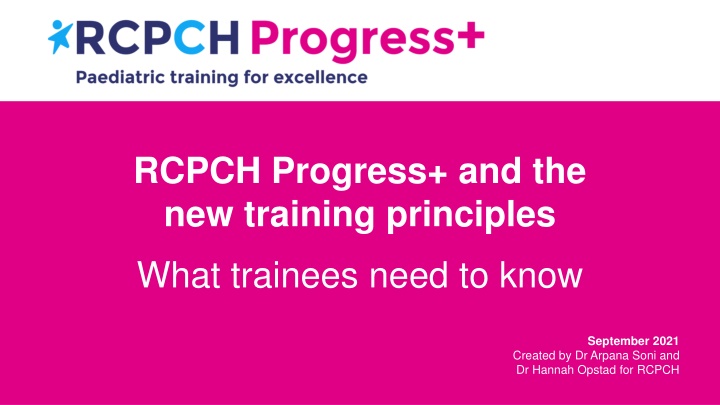
RCPCH Progress+ and New Training Principles Overview
Discover the latest updates on RCPCH Progress+ and the new training principles for paediatric trainees. From curriculum reforms to the importance of flexible training pathways, this presentation highlights the key changes and initiatives shaping the future of paediatric training. Stay informed and prepared for the evolving healthcare landscape.
Download Presentation

Please find below an Image/Link to download the presentation.
The content on the website is provided AS IS for your information and personal use only. It may not be sold, licensed, or shared on other websites without obtaining consent from the author. If you encounter any issues during the download, it is possible that the publisher has removed the file from their server.
You are allowed to download the files provided on this website for personal or commercial use, subject to the condition that they are used lawfully. All files are the property of their respective owners.
The content on the website is provided AS IS for your information and personal use only. It may not be sold, licensed, or shared on other websites without obtaining consent from the author.
E N D
Presentation Transcript
RCPCH Progress+ and the new training principles What trainees need to know September 2021 Created by Dr Arpana Soni and Dr Hannah Opstad for RCPCH
Whats covered in this presentation? Progress+ Curriculum Reforms from summer 2023 RCPCH Training Principles Principle of the Month monthly online resource package for trainees and supervisors, starting October 2021 The New Training Programme Structure
Progress+ Curriculum Reforms Why? Paediatricians of the future (us!) will face different challenges to those of our current consultants Healthcare is changing and the paediatric training programme needs to adapt in order to prepare trainees for this
Why the need for change? Training needs to provide more flexible working patterns and choice: Core training needs to be more inclusive: Adapt to changing population needs 37.7% of paediatric trainees are now working less than full time Increasing focus on long term and complex conditions We need to be a modern, forward thinking and family-friendly specialty that allows for flexible working, including Out of Programme (OOP) and Out of Programme Pause (OOPP) opportunities Inclusion of child and adolescent mental health and public health capabilities Ability to deliver integrated health care for children and young people Trainees to progress and manage their own training pathway to better suit individual needs
Progress+ curriculum Has been approved by the GMC and will be rolled out from August 2023 Paediatrician of the Future - published in October 2020, is a guidance document which outlines the new principles for paediatric training The guidance is based on: Anticipated future challenges paediatricians will face as a workforce The needs of children and young people going forwards Listening to the voices of the children and young people
What will change in practice? There is a new Paediatric Training Pathway which will change the shape and length of training The curriculum still has 11 domains but there are changes within this placing more focus on preventative health and mental health There are 11 new Principles of excellent training which have been created to optimise our training experience and better prepare us to help serve the children of the future
Curriculum Domains Curriculum Domain 1. Professional values and behaviours The 11 curriculum domains remain the same as before, but there is greater emphasis on health promotion, integrated care and mental health in the updated curriculum 2. Professional skills and knowledge: Communication 3. Professional skills and knowledge: Clinical procedures 4. Professional skills and knowledge: Patient management 5. Health promotion and illness prevention 6. Leadership and team working 7. Patient safety, including safe prescribing 8. Quality improvement 9. Safeguarding vulnerable children 10. Education and training 11. Research and scholarship
1. 2. Every patient encounter is a learning opportunity Complex case management provides rich learning opportunities Clinical reasoning skills are explicitly taught within training Patients and families are heard A biopsychosocial approach is applied at all times Leadership skills are developed and nurtured Training time and learning opportunities are prioritised within the workplace Educational supervision is high quality and provides consistency Morale and job satisfaction are improved 10. Assessment is used as a learning tool 11. Progression and length of training are personalised and flexible NEW! 11 RCPCH Training Principles of excellent training 3. 4. 5. 6. 7. 8. 9.
About the RCPCH Training Principles Written for Schools of Paediatrics to describe how they can deliver the very best training. Underpins all paediatric speciality training. To be applied within existing training settings. Support greater flexibility and diversity of the training experience. Learning Outcomes for Progress+ curriculum - no change to the 11 domains, each with learning outcomes for each level of training. Nice portrait photo here
RCPCH Principle of the Month Starting October 2021 with Principle 1: Every patient encounter is a learning opportunity. Monthly online resource package to support how your training can be shaped locally to meet each principle. This will include: Support and guidance to help you and your local department shape your training posts around the monthly principle. Examples of existing good practice; case studies of training opportunities that are already working well that you can adopt. Creative ideas, tips and contacts. The CYP voice why each the principle matters to them. And more .
The new paediatric training pathway Training will no longer be Level 1, 2 & 3 but a two-level run through comprised of Core and Specialty Paediatrics (a total of 7 years) Core Paediatrics (ST1-4) will include General Paediatrics and Neonatology, Integrated Care, Public Health, Community Child Health and Child and Adolescent Mental Health, with sub-speciality placement options Requirement to pass MRCPCH moves to the end of ST4 Specialty Paediatrics (ST5-7) will include General Paediatrics, Paediatric Emergency Medicine, Paediatric Intensive Care and Neonatal Intensive Care and sub- specialty training, broadly as it is in current higher training now Graded and supported move to middle grade rotas during core training
Core Paediatrics Notes ST1 ST2 ST3 ST4 General grounding in General Paediatrics, Neonatology, Integrated (primary/secondary) care, public health, and mental health Sub-specialty placement options Enhanced training to deal with uncertainty and decision-making, in preparation for Tier 2 working Recognises that currently many pre-MRCPCH ST3 are on Tier 2 rotas ST3 - transition to Tier 2 rota ST4 - 12 months on Tier 2 rota Will be provided with suitable support, supervision and assessment Exams MRCPCH Theory expected by end of ST3 MRCPCH Clinical expected by end of ST4 Tier 1 Transition to tier 2 Tier 2 New Core Training Programme Core curricular capabilities in General Paediatrics, Neonatology, Integrated (Primary/Secondary) Care, Public Health, Community Child Health, Child & Adolescent Mental Health ST4 trainees will be on tier 2 rota. Includes sub-specialty placements Trainees will transition to tier 2 working by the end of ST3, with suitable support, supervision and assessment. MRCPCH Theory MRCPCH Clinical
Specialty Paediatrics Specialty Paediatrics ST5 ST6 ST7 All trainees to gain the generic Learning Outcomes, as specified in Generic Paediatrics syllabus All trainees follow the Generic Syllabus plus one of the specific syllabi below: General Paediatrics CCT Paediatrics SPIN optional SPIN (If done) Sub-specialty Paediatrics CCT Sub-specialty 1 Paediatrics Sub-specialty 2 etc. (Sub-specialty) Sub-specialty Paediatrics Sub-specialty 3 etc. MRCPCH Clinical MRCPCH Theory
Specialty Paediatrics Sub-Specialty Paediatrics ST5 ST6 ST7 Training pathways All trainees follow the Generic Syllabus plus one of the specific syllabi below: Allergy, Immunology & Infectious Disease Child Mental Health Clinical Pharmacology Community Child Health Diabetes and Endocrinology Emergency Medicine Gastroenterology, Hepatology & Nutrition General Paediatrics Inherited Metabolic Medicine Intensive Care Medicine Neonatal Medicine Nephrology Neurodisability Neurology Oncology Palliative Medicine Respiratory Medicine Rheumatology General Paediatrics CCT Paediatrics SPIN optional SPIN (If done) 70% Sub-specialty Paediatrics CCT Sub-specialty 1 Paediatrics Sub-specialty 2 etc. (Sub-specialty) Sub-specialty Paediatrics 30% Sub-specialty 3 etc. MRCPCH Clinical MRCPCH Theory
Specialty Paediatrics Core Paediatrics OOP ST5 ST6 ST7 ST1 ST2 ST3 ST4 Pause Tier 1 Transition to tier 2 Tier 2 Tier 2 All trainees follow the Generic Syllabus plus one of the specific syllabi below: New Core Training Programme General Paediatrics CCT Paediatrics Core curricular capabilities in General Paediatrics, Neonatology, Integrated (Primary/Secondary) Care, Public Health, Community Child Health, Child & Adolescent Mental Health SPIN optional SPIN (If done) ST4 trainees will be on tier 2 rota. Out of Programme Sub-specialty Paediatrics CCT Sub-specialty 1 Paediatrics Includes sub-specialty placements Sub-specialty 2 etc. (Sub-specialty) Trainees will transition to tier 2 working by the end of ST3, with suitable support, supervision and assessment. Sub-specialty Paediatrics Sub-specialty 3 etc. MRCPCH Theory MRCPCH Clinical MRCPCH Clinical
Specialty Paediatrics Specialty Paediatrics ST5 ST6 ST7 Flexibility between specialty pathways All trainees follow the Generic Syllabus plus one of the specific syllabi below: There would be the potential for trainees to change specialty pathways, particularly between those with shared curricular content. General Paediatrics CCT Paediatrics SPIN optional SPIN (If done) 70% Sub-specialty Paediatrics Subject to appointment process Likely to be limited to transfer after the first year of specialty paediatrics. CCT Sub-specialty 1 Paediatrics Sub-specialty 2 etc. (Sub-specialty) Sub-specialty Paediatrics 30% Sub-specialty 3 etc. MRCPCH Clinical MRCPCH Theory
Transition from August 2023 Current L1 Trainees All trainees will transition to Core Paediatrics CCT date will be brought forward Current L2 Trainees ST4 trainees should move over to Core Paediatrics ST5 trainees could move directly to Specialty Paediatrics, if they wish, or remain in Core Paediatrics for a further year (depending upon their capability and choice) Current L3 Trainees All trainees in this cohort will change from Level 3 to Specialty Paediatrics No change in CCT date
Find out more on College website and social! Join us in October 2021 to learn more about Training Principle 1 More on the RCPCH website: Frequently asked questions Paediatrician of the future guide Maps of good practice Blogs and updates www.rcpch.ac.uk/progressplus Join the conversation on Twitter and Facebook #RCPCHProgressPlus
Together we can support your training to become excellent doctors for the children and young people of today and tomorrow



